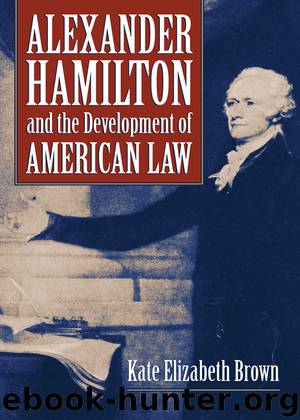Alexander Hamilton and the Development of American Law by Kate Elizabeth Brown

Author:Kate Elizabeth Brown
Language: eng
Format: epub
ISBN: 9780700624812
Publisher: University Press of Kansas
Published: 2017-07-12T16:00:00+00:00
The Federal Magistracy and the Law of the Land
In ways familiar to us, Hamilton helped to secure foreign investment in the United States using a set of preferred legal tools to accomplish his statecraft. When it came to disposing of land in economically productive ways, the federal government controlled western lands and territories, and the states presided over the sale of lands within their own borders. In the early republic, the state and federal governments had generally concurrent powers to dispose of lands and to secure foreign capital within their wholly separate jurisdictions. This general concurrence included adjudicating land disputes. In these types of cases, both the state courts and the federal courts (under diversity jurisdiction) had concurrent authority to hear claims made by citizens of different states or by aliens.10 Hamilton appeared in federal court to defend New York’s sovereignty in a series of land-related diversity cases, but he found the experience frustrating and detrimental to his client’s interests.11 He had more success in state court. Still, the federal government had substantial authority to adjudicate land claims as well as to attract foreign capital, and Hamilton exercised these powers when he served in the Treasury. As treasury secretary, Hamilton worked to secure foreign investment in the new nation at the federal level before representing the Holland Land Company’s interests in New York.
Throughout his tenure as treasury secretary, Hamilton arranged for the nation’s foreign debt to be serviced and refinanced, effectively paying down wartime debts contracted with Spain and France with new loans floated mainly from the Netherlands.12 Prioritizing the complete and timely payment of foreign debts under the new constitutional republic became the crucial way for the United States to establish and maintain its creditworthiness abroad—a fact that both Hamilton and the first Congresses recognized. While managing the payment of these foreign monies owed abroad, Hamilton developed a relationship with the Dutch bankers who, when organized in partnership as the Holland Land Company, would later become his clients.13
Although Hamilton’s posttreasury law practice focused on securing landed investments for his foreign clients, while in office, Hamilton’s economic policies enticed European investors to invest heavily in US government securities.14 British and Dutch bankers also invested in a portfolio of American corporate stocks, which included the Bank of the United States, various state banks, and the growing number of insurance and turnpike/canal corporations. By 1803, the value of US corporate stocks held by foreigners totaled $48.4 million, or 33 percent of the outstanding corporate stocks floated in the US domestic market.15
Investors from both Holland and England speculated heavily in American lands, though the Dutch considered their land investments in Maine, Pennsylvania, and New York, as well as their corporate investments in mills and road and canal companies, to be long-term.16 Given that foreign capital was hard at work underwriting American creditworthiness, commercial development, and land surveyance, Hamilton must have been pleased; these were the productive outcomes he imagined in his “Report on Manufactures.” As an added bonus, if US government lands could
Download
This site does not store any files on its server. We only index and link to content provided by other sites. Please contact the content providers to delete copyright contents if any and email us, we'll remove relevant links or contents immediately.
The Social Psychology of Inequality by Unknown(3031)
The Plant Paradox by Dr. Steven R. Gundry M.D(2621)
The Writing on the Wall by Anselm Jappe(2047)
Working for Yourself by J.D. (Nolo) Stephen Fishman(1873)
Get What's Yours for Medicare by Philip Moeller(1743)
Every Landlord's Legal Guide by Janet Portman & Stewart Marcia & Ralph Warner(1676)
The First 20 Hours: How to Learn Anything ... Fast by Kaufman Josh(1668)
ADHD on Trial by Michael Gordon(1579)
Decisive by Chip Heath(1570)
Working for Yourself by Stephen Fishman J.D. (Nolo)(1531)
Drafting Contracts: How and Why Lawyers Do What They Do, Second Edition by Stark Tina L(1499)
A Practical Guide to International Arbitration in London by Hilary Heilbron(1441)
The Lord of the Rings: The Fellowship of the Ring, the Two Towers, the Return of the King by J. R. R. Tolkien(1440)
Restitution by Restitution(1429)
The Economist Aug 8th 2015 by The Economist(1428)
Intellectual Property Strategy by John Palfrey(1426)
The Economist Aug 29th 2015 by The Economist(1392)
Collusion by Luke Harding(1325)
Persuasion by Owner(1300)
